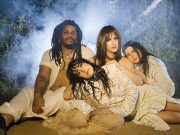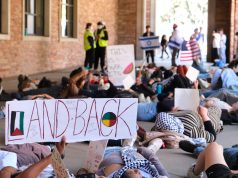Seeking to show that the state’s voter-approved ban
on gay marriage is rooted in discrimination, lawyers for same-sex
couples offered up two
throughout the day on how Proposition 8 is part of a long tradition of
denying gay couples equal rights and exposing them to campaigns of
ridicule. The historians, whose credibility as independent experts came
under immediate attack from Proposition 8 lawyers, testified in the
second day of the first federal court trial in the nation to test the
legality of a state’s ban on the right of same-sex couples to wed.
The trial resumes Wednesday morning before Chief U.S. District Judge
who is deciding a lawsuit filed on behalf of same-sex couples who argue
that Proposition 8 violates federal equal protection rights. The
question Wednesday is whether the trial will continue to unfold only
before the spectators in the judge’s courthouse here, or make it onto
the Web via broadcast on
whether to lift a stay on Walker’s earlier order allowing the delayed
broadcast of the proceedings on the court’s Web site by using
the justices put the unprecedented plan on hold earlier this week at
the request of Proposition 8 supporters, who oppose any broadcast of
the trial. They say broadcasting the court proceedings would expose
their witnesses to threats and intimidation, and would “negatively
affect the fairness of the trial.”
Meanwhile, the drama of the first day of the trial
on Monday gave way Tuesday to the dry but exhaustive testimony of two
expert witnesses for the plaintiffs,
Both Cott and Chauncey readily conceded they support
same-sex marriage. But despite hostile cross-examination from
Proposition 8 lawyers, they maintained that history and research drives
their view that gays and lesbians will inevitably earn the right to
marry.
Cott, whose occasional long-winded answers drew a
few barbs from both the judges and lawyers, was asked to shoot down
many of Proposition 8’s central contentions, such as the argument gay
marriage would damage traditional marriage or that marriage is designed
primarily for procreation. Noting that President
life, Cott testified: “There has never been a requirement that a couple
produce children to marry.”
In subsequent testimony, Chauncey walked the judge
through more than 100 years of discrimination against gays and
lesbians, dating back to laws banning them from assembling in public.
Plaintiff attorneys asked Chauncey how the Proposition 8 campaign fit
with that history.
“The wave of campaigns we’ve seen against gay
marriage rights the last decade are (part) of the cycle of anti-gay
rights campaigns,” he said.
Proposition 8 lawyers depicted both witnesses as
unabashed proponents of gay marriage. In fact, within minutes of Cott
leaving the stand, Proposition 8 counsel
plaintiffs” and that many of her views actually supported the arguments
for Proposition 8.
Chauncey is scheduled to take the stand again
Wednesday morning for more cross-examination. And the plaintiffs have
three more experts lined up for Wednesday’s trial proceedings.
—
(c) 2010, San Jose Mercury News (San Jose, Calif.).
Visit MercuryNews.com, the World Wide Web site of the
Distributed by McClatchy-Tribune Information Services.














































